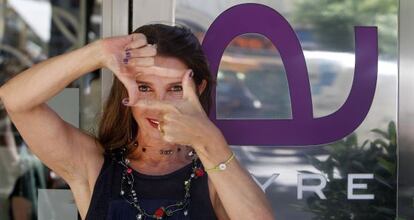What pains Victoria Abril about Spain
Almodóvar's former muse has not made a film in her home country for four years

The tip of her tongue traveling round her palate, Victoria Abril is preparing to pronounce a word as she most likes to, stretching it out and letting the air out in a rapid explosion: "Looobas." The new Spanish title of her latest film - She Wolves - is "more direct," she insists, "and more striking" than the original The Woman Who Brushed Off Her Tears.
The actress, who was recently at Valencia's Cinema Jove festival to present this Macedonia-filmed tragedy about two women trying to get ahead in a chauvinist world, considers herself just one of the pack. "Of course, I'm a she wolf, even though I've never had to sink my teeth into anyone," she says. "The only thing I did to protect my two children was to stay in France. To protect them from the paparazzi. I didn't have just one run-in with them, more like 15,000. And when I saw it was a lost battle, I stopped bringing them. We only go to my village in Málaga."
Though she was born in Madrid in 1959, she has Andalusian roots that appear in turns of phrase and idioms during the conversation. In Paris, where she took up residence in the 1980s, she has never had "any problems bringing up my children, who are now 18 and 20, as normal children; so that they study and don't appear in the papers without having done anything. That is impossible in Spain. I've always asked myself how Ana Belén managed it with her children. Like me she has worked in cinema since she was 14. She must be the only case of a woman, actress and mother who has been able to bring up her children outside of all this circus."
Abril has a problem with Spain or, rather, with a certain part of the press and the film industry. She openly admits it, in the frank, colloquial and sometimes abrupt language that characterizes her. "Spanish cinema overlooks me a lot, a lot," she says. It's four years since she shot her last film in Spain, Agustín Díaz Yanes' Solo quiero caminar.
Spanish cinema overlooks me a lot, a lot"
It was under Díaz Yanes' direction that Abril won her second Silver Shell at San Sebastián (the first was in 1987 for El Lute) and a Goya Award for Best Actress for Nadie hablará de nosotras cuando hayamos muerto (or, Nobody Will Speak of Us When We're Dead) in 1995.
It was back in the 1990s that she reached the height of her fame in Spain and France after her performances in three Pedro Almodóvar films - Tie Me Up! Tie Me Down!, Kika and High Heels. Her European stardom led to an American adventure in Barry Levinson's Jimmy Hollywood, but it was a round trip.
Then she had to cross the desert of the forties and she once again reinvented herself. "The truth is I reinvent myself every day, dude. I am never doing what I expect. I trained to be a dancer and I've spent 20 years making movies; then the moment of the forties came when they don't know what to do with you and I started singing," she says.
It was a decade ago that she also reinvented herself as her own agent after some "ruinous" experiences.
But there is one way in which Abril says she hasn't reinvented herself. She hates hospitals and says she would never have plastic surgery, even though she has given up the media gossip war on the subject for lost.
"They say I am pretty, but what has happened now is that I have at last put on these three kilos that feel so good on my face. When you are young, having a bit of a skinny face looks good, it's photogenic. After your forties, it's better to put it on. My boyfriend likes it more. I have more tits, more ass. After your forties, it's better to get porky than shrivel up."








































